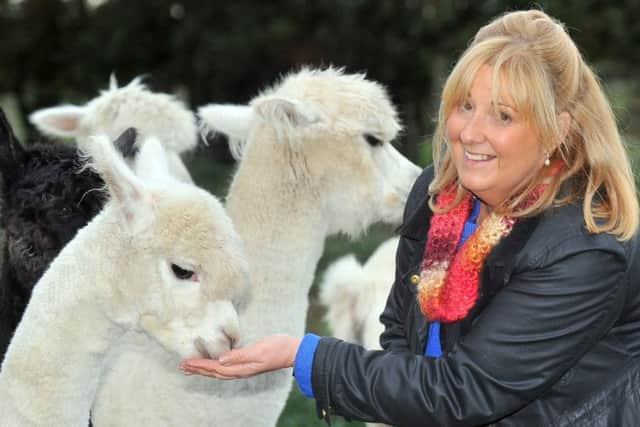Walking with the alpacas
In their case the dual purpose extends to fleece and the tourism and leisure sector.
One of the relative newcomers to the world of hosting alpaca trekking is Sam Harrison of Sherburn Common Farm just outside Sherburn in Elmet.
Advertisement
Hide AdAdvertisement
Hide AdSam has assembled a herd of, currently, 14 alpacas and her trekking activities as well as crafts enterprise and now venue for children’s parties is booming.


“We started about 18 months ago and initially thought we would stop between Christmas and Easter but last winter it was so mild and we had people ringing up to come.
“We don’t take children under 10 on the treks because the alpacas have the potential to kick, but young children can help feed them with carrots.
“We’ve expanded quickly and we are now moving in to what was an old dairy building for the crafts, parties, refreshments and toilets, including for disabled people.
Advertisement
Hide AdAdvertisement
Hide Ad“When people book I chat to find out how confident they will be with animals.
“If they are used to horses I will let them take a more confident alpaca, but those who have limited experience I will line up with what I call my Scarborough donkeys.”
Next Saturday sees the annual Yorkshire Alpaca Group show and sale at York Auction Centre in Murton and Sam will be there, possibly with buying in mind.
“I’m not showing, but I would like to in future.
“It’s a lot about the right timing for us and at this stage of the year the farm has to come first.
Advertisement
Hide AdAdvertisement
Hide Ad“It’s a family farming enterprise run by my husband, Bernard, and his two brothers, John and David, across three farms here and at Wistow near Selby across around 1000 acres with one of our three sons, Tim, and our nephew, Richard, also involved.
“It’s all arable, combinable crops. They’ve been struggling to get crops in because it is just too wet.
“It has been an absolute nightmare.
“If I see something that is right for us at Murton, I won’t say no. My ideal addition would be a halter trained coloured male as we only have one coloured male at present. That’s Rolo who is chocolate and toffee coloured, who was the first to arrive with Casper who is white with a creamy top. All my alpacas are the Huacaya breed.
“I started with those two males coming up to seven years ago when Tim and our middle son Greg bought them for me as a Christmas present. I’d thought about having some a couple of years previously.
Advertisement
Hide AdAdvertisement
Hide Ad“I’d never had animals on the farm apart from a dog. I’m from Tadcaster originally, not from a farming background and we’re about crops here not livestock.”
The catalyst for Sam’s move into the quadruped market came following a slipped disc that led to surgery and leaving her job of working with children who had behavioural problems.
She battled on where she was working following her operation to see out the school year and to support a specific pupil she was working with but between the Christmas arrival of Rolo and Casper and leaving her role the Harrisons’ four-footed army was gaining momentum.
“I’d seen two pigmy goats on the Pre Loved website and they live really well together with the alpacas – even though they are much bigger than pigmy goats as it has turned out.
Advertisement
Hide AdAdvertisement
Hide Ad“Then I thought it would be nice to have a couple of pet lambs to bottle feed, so they duly arrived from a neighbouring farmer.
“Six animals, two of each, no plans, but a few months after I’d finished at school Tim said he fancied getting some Ryelands or South Downs and would I help. He wanted to have a go at lambing.
“I have the smallest hands and he wanted me to help with getting lambs out of the ewes when needed. Tim gradually acquired his flock.
“We lambed, it went well and currently we have a dozen breeding ewes.
Advertisement
Hide AdAdvertisement
Hide Ad“I thought to myself I’ve done okay lambing, how hard can it be to breed alpacas?
“The boys had acquired Rolo and Casper from a huge herd over in Kirkby Lonsdale but now I needed breeding females. I looked on the internet and found the Yorkshire Alpaca Group.
“I contacted Sylvia Sharpe from Stamford Bridge and asked whether she had any for sale. We agreed to buy two female alpacas from her, one of which was possibly pregnant.”
This was where nothing on the breeding side, it seemed, was to go quite right for Sam.
Advertisement
Hide AdAdvertisement
Hide AdA succession of phantom pregnancies, premature and difficult births tested her resolve but finally around a year ago the Harrisons had their first new-born cria that survived.
“We call her Elena which means ray of light, which we felt appropriate after the week we’d had losing another before her. She’s gorgeous, pure white, a little tinker and I love her to bits. Thanks to Sylvia in the main we now have six males and eight females.
“You cannot live with them and not like them.
“When we took the baby cria that we couldn’t save back to his mother Maria, because she had to know and sniff it to understand where he was, she let out the most haunting sound.
“We were already in tears and she shed tears too, but then she touched my nose.
Advertisement
Hide AdAdvertisement
Hide Ad“I’ve heard recently that alpacas are described as dolphins on land and that’s something I now see. When you get a connection with one like that it is almost spiritual.”
What Sam will not be doing at Murton next week is selling any of her alpacas as they aim to get the herd to 20 in the near future.